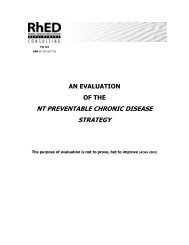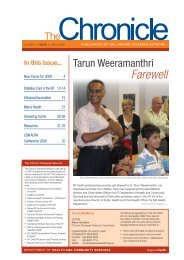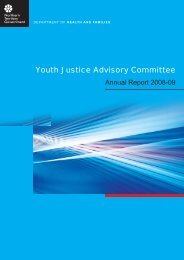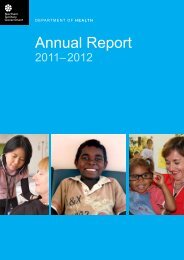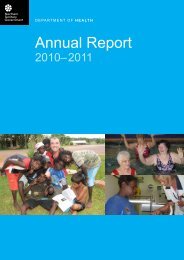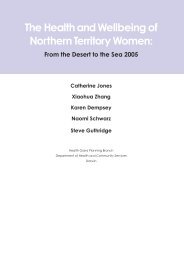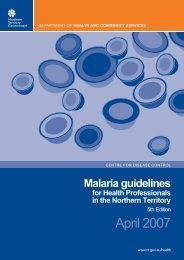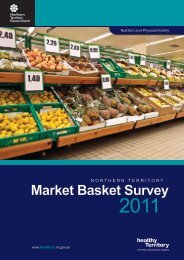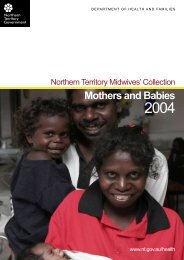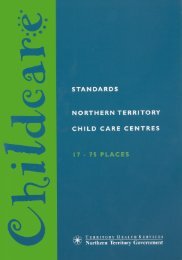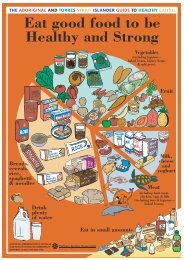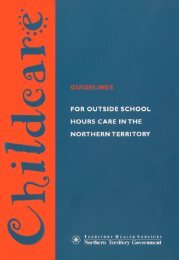DHF Annual Report 2009 - NT Health Digital Library - Northern ...
DHF Annual Report 2009 - NT Health Digital Library - Northern ...
DHF Annual Report 2009 - NT Health Digital Library - Northern ...
You also want an ePaper? Increase the reach of your titles
YUMPU automatically turns print PDFs into web optimized ePapers that Google loves.
very effective with the Alice Springs region achievingan impressive 42% vaccination coverage rate. Aneducation campaign on sexually transmitted diseaseswas also a priority in <strong>2009</strong>-10 with Central Australia’sCDC working with young people to develop the DVDAny Chance. The DVD promotes choices in sex,alcohol and safety and is being distributed throughoutthe <strong>Northern</strong> Territory.Alice Springs Hospital (ASH) introduced a numberof innovations in <strong>2009</strong>-10 including a Paediatric UnitPlaygroup conducted by Tangentyere Council. Anextension of the Hospital in the Home program toseven days a week resulted in 2567 bed days savedover the twelve months to June 2010. The ASHMidwifery Group Practice provided 240 women witha choice of care including a designated Midwife andhome birthing.The Alice Springs Hospital Drovers Volunteer ServiceService category of the <strong>2009</strong> Rural and OutbackAwards. Founder of the Drovers, Ms Di Deans, wasalso recognised as the <strong>2009</strong> Centralian of the Year.The Drovers fundraising provided more than $50000 worth of equipment and materials, including awig library for those suffering hair loss as a result ofdisease or medical treatment.Central Australian Mental <strong>Health</strong> Services staff gainedaccreditation in Mental <strong>Health</strong> First Aid InstructorTraining in order to provide training to other serviceproviders in the broader community and to raiseawareness and education around mental health. Thisand prevention strategies in line with the NationalMental <strong>Health</strong> Standards. A Psychology OutpatientClinic for clients was established taking referrals fromcase managers, psychiatrists and medical staff andan emphasis on mental ill health prevention was thefocus of the Youth Mental <strong>Health</strong> First Aid service.The Aged and Disability program increased utilisationof the Community Services Program Network ClientManagement Framework in <strong>2009</strong>-10. Guidelineswere developed and implemented and these haveresulted in interagency shared case management.The development of an <strong>NT</strong> wide practice manual isunderway to ensure equity in service access andeligibility in the disability sector.Central Australian Oral <strong>Health</strong> Services focused onmanagement of its waitlist in <strong>2009</strong>-10 and as a resultsaw a reduction in waiting times for dental servicesin Alice Springs to approximately six months. Oral<strong>Health</strong> Services maintained its collaboration withAdelaide and Melbourne Universities and provided dental students. Work experience placements werealso provided for local high school students. Allremote communities were provided with access toservices via mobile dental trucks and regular visits toremote clinics.Targeted Families Support program achievedexcellent results in <strong>2009</strong>-10 and additional andfunding was provided to Central Australian AboriginalCongress to expand the service in Alice Springs. ATargeted Family Support Service was implementedin Tennant Creek using an inter agency casemanagement protocol. Therapeutic services wereestablished for children and young people in the ChildProtection, Out of Home Care system and/or SafeFamilies program at Tangentyere Council.Remote <strong>Health</strong> Services conducted the basic trainingcourse for community based workers at Haasts Bluff.Joint service plans were completed with WYN <strong>Health</strong>(Willowra, Yuendemu and Nyirripi <strong>Health</strong>), WAHAC(Western Aranda <strong>Health</strong> Aboriginal Corporation)and Anyiniginyi. Remote Medical Practitioner casereviews and clinical records audits were implementedand activity and incident data reviewed by Remote<strong>Health</strong> Executive on a monthly basis. A process to standards has commenced and Remote <strong>Health</strong>Services have increased employment of communitymembers to assist with service delivery.<strong>Health</strong> Development adopted a multi-disciplinaryapproach for service delivery based alonggeographical lines in order to deliver a rangeof specialised programs to remote Aboriginalcommunities. The Failure to Thrive project wasestablished as a collaborative project betweenGovernment and non-government agencies inCentral Australia and has resulted in an integrated/care pathway case management model, a Child<strong>Health</strong> Resource Directory and the re-establishmentof Under 10s case management meetings for theDepartment and other service providers.Department <strong>Health</strong> and Families 61



